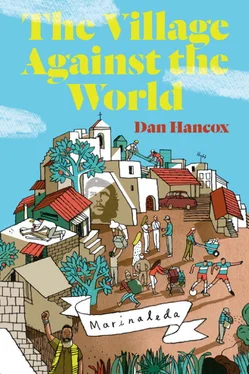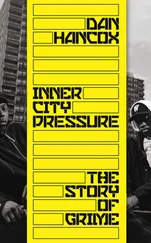Michael sighed. ‘The situation is much better in Marinaleda now, of course,’ he said. ‘But we are still always fighting. Struggles, protests, demonstrations – here, in Seville, wherever.’ I asked if Prince Felipe had ever answered their letter. He rolled his eyes slightly. ‘What do you think?’ he said, handed the book back to me, and turned back to the football.
In the mid-1990s, the Seville University anthropologist Félix Talego Vázquez lived in Marinaleda for a year, researching his doctoral thesis. This thesis was published as a controversial book – controversial in Marinaleda, anyway – whose title translates as Worker Culture, People Power and Messianic Leadership . Talego saw the relentless struggle of the early years as a vital part of the solidification of Sánchez Gordillo’s leadership, not least during the hunger strike. Characterising your political project, as Sánchez Gordillo did, as la voz de los sin voz – the voice of those without a voice – and embarking on something as psychologically and emotionally significant as a group hunger strike, strengthens the distinction between an authentic, popular ‘us’ and a distant, oppressive, hegemonic ‘them’. In view of Andalusia’s history, I’m not sure this is an idea which requires much strengthening.
The hunger strike certainly went a long way in granting the man with the megaphone – both literally and figuratively, there is always one man holding Marinaleda’s megaphone; he seems to carry the thing everywhere he goes – the right to speak for the pueblo . His older supporters in the village have told me that at a time when they had no voice, and had never had a voice throughout their history, they were happy that someone had a megáfono , and knew how to use it.
After centuries of being ignored, marginalised and near-starved, Marinaleda’s skill at attracting the mass media was finally helping them address these problems. During the hunger strike, the village was inundated by the national press and TV along with the BBC, German TV, French, English, German and Catalan newspapers, and even famosos , celebrities like the Andalusian folk singer Carlos Cano. There was also an influx of leftist intellectuals, writers and politicians, clamouring to express their solidarity.
The strike was regarded as a success, wrote Talego, not because they acquired the funds to keep them going until the black olive harvest later that year, but because of the Shockwaves they sent through the rest of Andalusia and Spain via the media: ‘The press were to the Marinaleda hunger strike what the bride is to the wedding.’ Sánchez Gordillo was certainly happy to see them, especially the foreign reporters from England and Germany: ‘They gather a lot of material’, he wrote in his hunger strike diary, ‘to throw in the faces of those trying to lie. Thank goodness, because otherwise, the bourgeoisie had mounted a slander with enough clout to destroy and discredit the heroic struggle of the Andalusian jornaleros .’
It’s no overstatement to say that the village itself was changed by the hunger strike. They were flattered by the attention, and perhaps even became fascinated by their own reflection. ‘People were busy all morning reading the papers’, wrote Talego, ‘to find new stories in which they were the protagonists, to feel the almost magical thrill of seeing their friends and acquaintances displayed in pictures all through Andalusia and Spain.’ Talego concluded that in this case at least, the observed object got pretty used to being observed, and rather enjoyed the experience.
From then on, reckons Talego, ‘it was evident that Juan Manuel was someone special, different from the rest of those who were also on strike.’ He’s not wrong; Sánchez Gordillo proved then, and has been proving ever since, that he has a keen eye for the media. But why were the press interested? Why were their readers interested? Why did the coverage succeed, ultimately, in swaying a recalcitrant government? Perhaps because people wanted to hear what was coming from Sánchez Gordillo’s megaphone.
Matters didn’t stop there. In April 1981 there was another hunger strike over the continued lack of funds for community employment – futile work in any case, as Sánchez Gordillo said, which ‘robs us of our dignity’.
This time, 315 workers went on hunger strike. In the first three months of 1981, the unemployed had only received funds to pay for two days of work per week, representing an income of 2,066 pesetas a week to support them and their families. It seems extraordinary now, but in that pre-internet world of communications, Marinaleda was so isolated that Pérez-Beneyto, the civil governor of Seville, thought he could get away with telling the newspapers that the hunger strike was not really happening. It would be a day or so before anyone would get there and be able to contradict him, which the newspapers duly did. What they reported did not make Pérez-Beneyto look any better.
‘One day, all Andalusia will go up in flames,’ one of Marinaleda’s jornaleros told the press, contemplating the mud and weeds in the gutters he was clearing in exchange for his derisory community employment pay.
After a week on hunger strike, more cases of hypoglycemia, fainting and malnutrition were reported by the doctors, and one old woman fell into a semi-comatose state. Hunger in Andalusia, said Sánchez Gordillo, is not merely ‘a ghost running through the village. Hunger is a man of flesh and blood who has to support his children.’ Four hundred people locked themselves into the village Sindicato building, where the assemblies happen now; the weaker ones lay on mattresses. In the town of Teba, also on hunger strike, a man died from complications relating to malnutrition. On this occasion, they secured a guarantee of four-days-per-week community employment for those without work.
But it was not enough. ‘Return our stolen dignity!’ demanded Sánchez Gordillo in a piece for El País in 1982, calling for ‘real work’, which could only come from redistribution of the land—not through community employment and stealing chickens.
‘What is needed in Andalusia’, he wrote, ‘is a profound transformation of agricultural structures that generate wealth for a minority of landowners, and poverty, unemployment and hopelessness for the vast numbers of peasant labourers.’
And so they kept campaigning for changes to those agricultural structures, piece by piece. There were protests over the lack of water – for consumption, but also for irrigation – throughout the early 1980s. They were forced to share a well with the neighbouring towns of Gilena and El Rubio, and responded by occupying municipal buildings and scrawling ¡Queremos agua! (We want water!) on their election ballots. For twenty-three days they staged a symbolic ‘light strike’, turning off all electric lights from 8 pm, a reference to the limited three or four hours they were allowed access to the well each day.
In fact, there was another well nearby, on the land of the Duke of Infantado. They tried to negotiate with him, hoping that El Rubio and Marinaleda could buy a certain amount of water every month. The Duke turned them down: he needed it to water his olive trees. The level of class hatred in this part of the world is difficult to grasp without these kinds of incidents in mind – it reads like a medieval struggle for basic sustenance, not Western Europe in the 1980s.
As Sánchez Gordillo and a few others locked themselves in the council building once again, the rest of the village voted for a hunger strike. After a few days of this, a solution was found (one suggested by Sánchez Gordillo at the start, but rejected by the regional government), with Marinaleda and El Rubio allowed into a consortium to run a pipe from a well in Écija. A few months later, a fresh supply was discovered in Estepa and a new well was dug there. Upon its official opening, Sánchez Gordillo addressed the soon-to-be mayor of Seville, Manuel del Valle Arévalo:
Читать дальше












